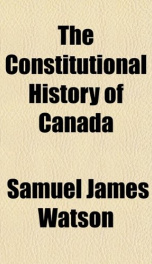the constitutional history of canada

Purchase of this book includes free trial access to www.million-books.com where you can read more than a million books for free. This is an OCR edition with typos. Excerpt from book: CHAPTER VI. DISSATISFACTION OF THE MAJORITY OF THE FRENCH CANADIANS. -- AMERICAN OVERTURES AND INVASION. The British Ministry, in the passing of the Quebec Act, had achieved two objects. They had gained over the clergy and the seigniors; and had induced the French Canadian people to recognize the supreme authority of the House of Commons in the matter of taxation. This race, for generations, was obliged to pay taxes without open murmur or chance of relief. It was unacquainted with the constitutional machinery by which the men of Great Britain could restrain the undue exercise of the taxing power. To the French Canadians, therefore, this power was one they could but too well understand, knowing not how to modify or resist it. For this reason the French Canadians offered no opposition to a Bill which followed the Quebec Act. t The measure was memorable in this -- that it was the first tax bill Great Britain ever passed with respect to Canada; and that it abolished the French customs duties, which had been allowed, since the Conquest, to remain unchanged. The preamble recited that certain duties wereimposed by the authority of His Most Christian Majesty the King of France. These duties were declared to be abolished, and others substituted, after the 5th of April, 1775. Garneau's " History of Canada," vol. 2, p. 119. t The title was -- "An Act to establish a Fund towards further defraying the charge of the Administration of Justice, and the Support of Civil Government, within the Province of Quebec," The composition of the Council was amongst the first grievances of which the French Canadians made complaint. In the year of the passing of the Quebec Act, 1774, Governor Carleton, who had been created a Major- Greneral while in England, returned to Canada, to put the ...
Users who have this book
Users who want this book
What readers are saying
What do you think? Write your own comment on this book!
write a commentGenre
if you like the constitutional history of canada try:
Other books by this author
Do you want to exchange books? It’s EASY!
Get registered and find other users who want to give their favourite books to good hands!


